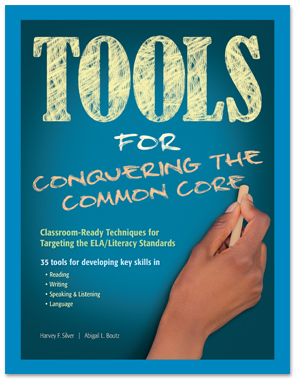|
In September, Harvey Silver was in Olean presenting to area districts about student engagement;” Tools for Conquering the Common Core.” During the training, Harvey spent time talking about student’s cognitive engagement and discussed the Eight C’s of Engagement to increase our students’ commitment to learning? Here are some quick ideas to get you started.
Competition. There’s no question that competition is motivating to many students, but if too extreme, competition can become a liability in the classroom. To maximize the motivational power of competition, focus classroom activities around mild and friendly forms of competition that allow everyone to experience success. For example, near the end of each unit, you might use well-designed learning games or Vocabulary Jeopardy to help your students review and master key terms for the test. Challenge. Why do so many people work so hard to ski down a double black diamond slope? Why do so many students choose to play the hardest level of their favorite video games? Because they love a challenge. You can increase the level of challenge in your classroom b providing tasks at three different levels and allowing students to choose the task they feel most capable of completing (Graduated Difficulty: see Silver, Strong, & Perini, 2007, based on the work of Musska Moston, 1972). More generally, you can foster a challenge-oriented classroom by letting your students know that you expect excellence and by “daring them to go the extra mile.” Curiosity. Look for opportunities to puzzle your students, to engage them in solving mysteries associated with your content. For example, why not start a unit on the American Revolution with this question: How did an untested ragtag militia defeat the most powerful army in the world? Or a lesson on insects with these questions: Why do we need pests like insects, anyway? Would we be better off if we got rid of them? Provoke students to inquire, investigate, and go beyond the yes and no questions. Controversy. Our content areas are loaded with controversies, arguments, and intellectual disagreements. Invite students into the controversy. Challenge them to take and defend positions on the “hot button” issues at the heart of your discipline (Do women and men write differently? Was Algebra invented or discovered? Is global warming more a result of human activity or natural causes?). Choice. You can easily capitalize on this powerful motivator by giving students more opportunities to make selections and decisions about their learning. Learning centers and Shared Interest Groups (small groups of students working together to learn about a topic of common interest) let students explore content in ways that work best for them, while choice-based assignments and projects offer students the chance to decide how to demonstrate what they’ve learned. Creativity. Many students long to express their uniqueness and individuality. Look for ways to invite their creativity into your classroom through divergent thinking activities, non- routine problem-solving, metaphorical thinking (How is a colony like a child?), projects, and just about any way you can think of that allows students to put their own original stamp on what they’re learning. Cooperation. For many students, the greatest inspiration comes in knowing that they’re part of a community of learners. Nurture this sense of belonging through cooperative learning activities, learning partnerships, small group work, and lots of classroom discussion. Or, the next time students conduct research, try Jigsaw (Aronson, et al., 1978/Slavin, 1995), which organizes research projects around a highly effective cooperative structure. Connections. Why do I need to learn this? Why does it matter to me? These are common questions from students, and in them we can hear students looking for – and not finding – a way to connect what they’re learning to their lives beyond the school walls. It doesn’t take much to let students express their own opinions or to encourage them to draw on their experiences before, during, or at the end of any lesson or unit. Work questions and activities involving students’ values, priorities, and experiences into your content (When is rebellion justified? Have you ever used fractions to settle a dispute? What do you want to learn about spiders?). By: Tessa Levitt, CA BOCES Professional Development and Whitesville Central School
0 Comments
Your comment will be posted after it is approved.
Leave a Reply. |
Follow us on
|


